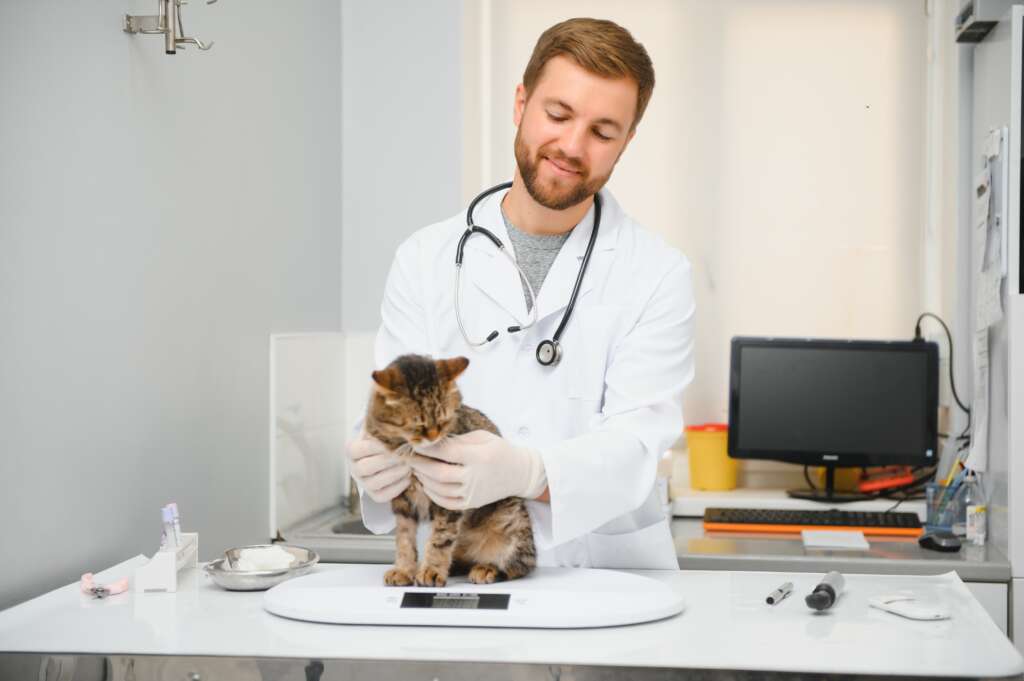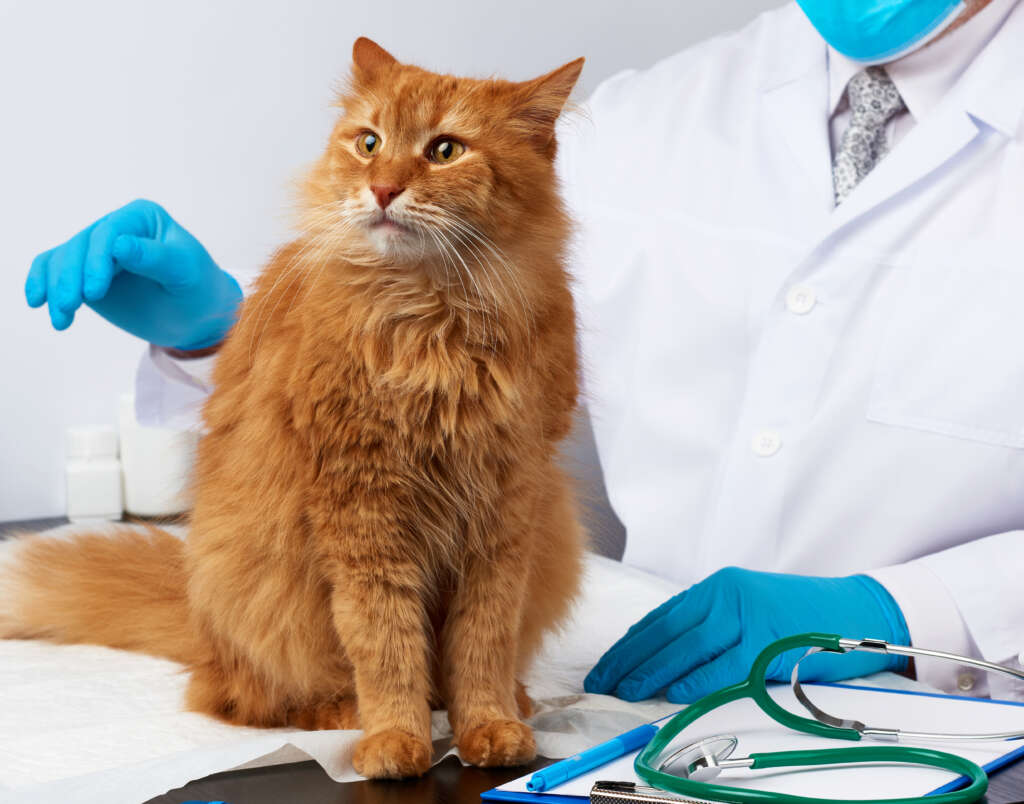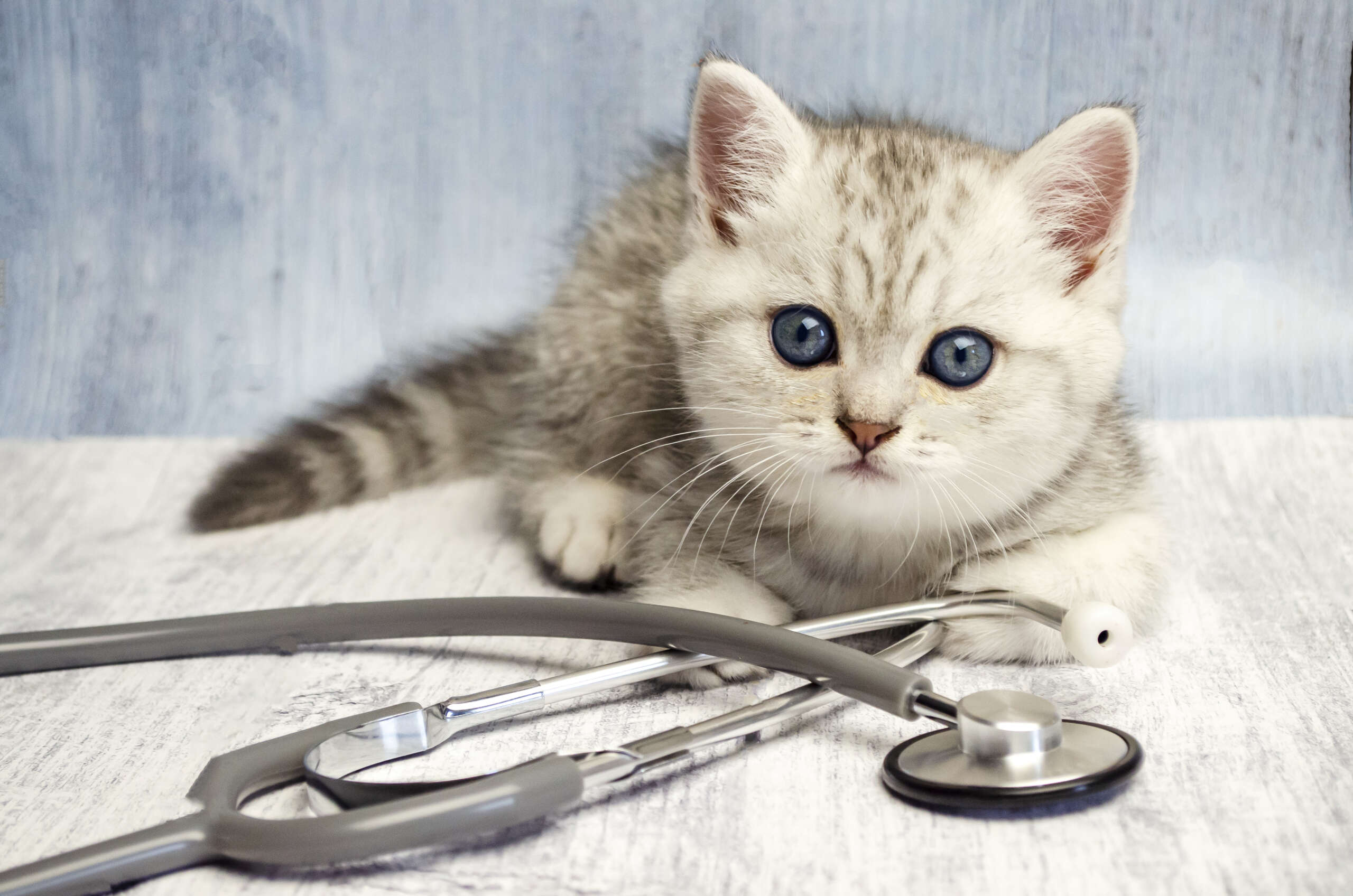Share This Article
Have you ever watched your cat leap with grace or stalk a toy silently? Cats are experts at hiding when they’re not feeling well. It’s hard to know if your cat is sick, especially if they don’t show it. Regular vet visits can be key to your cat’s health, but how important are they?
Kittens start their health journey with monthly check-ups and shots from 8 weeks old. They get vaccines to prevent diseases over 16 weeks. As they grow, cats need yearly vet visits to stay healthy. Senior cats need checks every six months.
Vet check-ups do more than just check health. They help prevent big medical bills. Places like Animal Hospital of Clemmons offer wellness plans to help with costs. Getting regular vet care can save money and keep your cat healthy.
Regular vet visits are crucial for your cat’s health. Changes in behavior could mean they need a vet. If your cat has trouble breathing or collapses, see a vet right away.
We’ll explore why regular vet visits are so important. They help keep your cat healthy and teach you about their health. Next, we’ll look at signs of health problems, how to spot them, and the benefits of regular care for your cat.
Understanding the Importance of Regular Vet Check-Ups for Cats
For pet owners, regular vet check-ups are key. They’re not just for your cat’s health but also for better feline vet care. Cats hide pain well, which means owners might miss signs of illness. That’s why catching health problems early is crucial.
Wellness exams are vital for cat health maintenance. Vets use tests and exams to spot early signs of diseases like hyperthyroidism and diabetes. A simple mouth check can show signs of oral tumors or diabetes. Eye exams can catch glaucoma or other brain-related issues early.
Veterinarians are trained to detect subtle cues of illness during check-ups, playing a crucial role in the early detection and management of health issues that can otherwise go unnoticed.
Preventative care for cats is key to avoiding health problems. Regular checks, blood tests, and fecal exams help catch serious diseases early. A vet’s baseline health checks can lead to early treatment, saving lives and cutting costs.
Regular vet visits also teach owners about preventative care for cats. You learn about nutrition, weight control, and handling minor health issues at home. This helps keep a good relationship with your vet, which is key for managing chronic health issues in older cats.
The real value of regular vet visits is the peace of mind they give. Knowing your cat’s health is being monitored and you’re taking steps to keep them well reduces worry. These visits ensure your cat stays healthy and happy.
Deciphering the Silent Signals: The Hidden Signs of Cat Health Issues
Cats, known for their calm nature, often hide signs of illness. This makes cat health maintenance hard for many owners. Routine veterinary visits are key to spotting these hidden changes. For instance, hypertension in cats is often silent but can be serious, hinting at issues like kidney failure or hyperthyroidism.
At routine veterinary visits, vets use tests like blood pressure checks and eye exams. These are vital for cats over eight years old. They help catch health problems like high blood pressure early. Catching these issues early through cat health check-ups helps manage them before they get worse.
Early detection and regular cat health check-ups can greatly improve how we handle cat health issues.
Keeping up with routine veterinary visits also helps cats get used to the vet’s office. This lowers stress and anxiety during exams. Stress can mess with the accuracy of tests like blood pressure checks.

Understanding and acting on our cats’ silent health signals through cat health maintenance improves their life quality and length. A good relationship with your vet and making visits comfortable for your cat is key to managing their health well.
Connecting the Dots: Subtle Symptoms and Expert Diagnosis
Cats often show subtle symptoms that can be missed until they become serious health problems. Cat owners need to know the difference between normal and unusual behavior or changes. Feline vet care helps bridge this gap, turning unclear symptoms into clear diagnoses. By spotting early signs and taking preventative care for cats, vets are key to keeping cats healthy.

About 70% of cats get periodontal disease by age three. It starts with mild gum inflammation but can get worse if ignored. A vet can catch this early by checking your cat’s mouth during routine visits. Also, knowing when your cat is gaining or losing weight is crucial, as many cats are overweight or obese. This can lead to serious health problems like diabetes and liver disease.
Changes in how your cat uses the litter box can also point to health issues. These could be from stress or kidney disease. A simple skin elasticity test can check if your cat is dehydrated. If the skin quickly goes back into place, your cat is likely hydrated. But if it doesn’t, it could mean dehydration, possibly from kidney or thyroid problems.
The American Veterinary Medical Association suggests yearly or bi-yearly check-ups for cats. These visits include detailed checks that are key to preventative care for cats. They help spot and treat small health problems before they get big, thanks to vets’ expertise.
Being watchful helps your cat live a longer, healthier life. Regular vet visits help track and treat health issues early. This shows why feline vet care is so important. It helps your cat live its best life.
Nipping Health Costs in the Bud: The Financial Benefit of Preventative Feline Vet Care

Regular cat vet visits are key to keeping pet care costs down over time. The yearly cost for a cat’s care is about $2,542. This includes things like yearly exams, shots, and medicines. With good preventative care, you might even spend less.
Conditions like diabetes can turn into expensive problems if caught late during routine cat health check-ups. Not managing feline diabetes early can lead to serious issues like diabetic ketoacidosis (DKA). This condition needs emergency and costly treatments. So, vet check-ups are important for keeping health in check and saving money.
Vets say dental care for pets can cost between $450 and $1,000. Regular vet visits help spot dental problems early. This means cheaper fixes before they get worse. Also, not catching parasites early can lead to expensive diseases. So, it’s smart to prevent parasites with treatments done at least four times a year.
By thinking ahead, cat owners can dodge the high costs of emergency vet bills. This way, you keep your cat healthy and your wallet safe. So, making sure your cat gets regular health check-ups is smart for their health and your wallet.
Cat Health Check-Ups: More Than Just a Physical Assessment
Understanding the full scope of cat vet visits is key to keeping our feline friends healthy. These visits include many preventative steps and tests that are crucial for preventative care for cats. From kittens to senior cats, each life stage needs its own health plan.
For kittens, monthly wellness exams are a must. These visits help with vaccinations and keep an eye on the kitten’s growth. By one-year-old, a kitten is like a 15 to 16-year-old human, showing how fast they grow.
As cats get older, they need check-ups every year, then every six months after age 11. This change is because older cats face more health risks. Tests like blood counts and thyroid hormone tests are key during these visits, giving insights into the cat’s health.
Feline vet care is more than just exams and tests. Vets also offer advice on diet, exercise, and keeping the cat’s environment interesting. This helps keep the cat healthy in many ways, making a care plan that changes as the cat ages.
Regular vet visits help catch diseases early, which can save money later. Treating a disease early can stop more serious problems and expensive treatments. This means a better life for our pets and less worry about vet bills.
Regular cat vet visits are key for caring for cats. They help keep cats healthy and happy, making pet ownership peaceful and worry-free.
Routine Veterinary Visits as Educational Opportunities for Cat Owners
Vet check-ups are crucial for our cats’ health and teach us a lot. Cats hide when they’re sick, which means we might not notice health problems until they’re serious. Regular vet visits help catch these issues early, which can make treatment more successful.
During these visits, we learn a lot about keeping our cats healthy. For instance, being overweight is a big problem for cats, affecting up to 60% of them. And, many cats over three years old have dental problems, which can be avoided with early care.
Cat-Friendly Practices are great because they keep their staff learning and focus on preventing health problems. These visits are key to keeping our cats healthy and happy.
Visits to the vet are more than just check-ups; they’re chances to learn and grow with our cats. As cats get older, their health needs change, just like people do. These visits help us understand how to care for our aging cats.
They also teach us how to manage pain and use special equipment for cats. In short, regular vet visits are vital for caring for our cats. They help us give our pets the best care possible throughout their lives.


